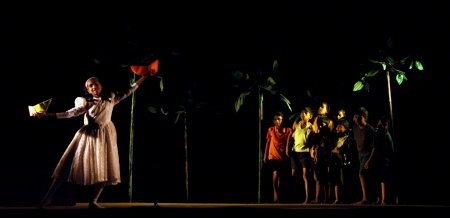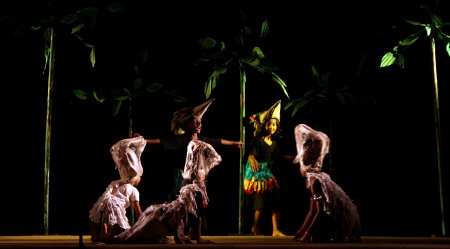 |
 |
Homecoming:
A tribute to Tagore September 28, 2010 India celebrates the 150th birth anniversary of Rabindranath Tagore, the first Asian Nobel Laureate, and the 50th anniversary of 'Geethanjali' that won him the prize. Of the many titans that built modern India, Tagore was the one person who has known the soul of India, palpable in nature and among the folk. Primarily a mystic, Tagore stood for the weak marginalized by the mainstream. Humanism was his philosophy. Tagore's interest in drama started in his youth. He translated, scripted, directed, and acted. Poetic dramas where music and dance played major roles were his gifts. Many of his short-stories became plays and films later.
KV Ganesh, the artistic director of Rangachethana, has taken his groups to many a stage: regional, national, and international. He has catered to the needs of children from marginalized segments. Children from the outskirts of Thrissur have been gathering here for two workshops a year. This is the second time that Ganesh takes his group to Delhi for a drama festival. 'Homecoming', selected at state level, will be staged in NSD, Delhi, on October 4, 2010. Veettilekku, a Malayalam drama based on Tagore's story 'Homecoming,' illustrates how his themes are eternal yet, modern. The play is a sensitive portrayal of a village boy in urban setting. Nurtured by rural ethos amidst birds, animals and humans in a natural terrain, Pathik rises to be the ringleader among village urchins. But sibling rivalry has pushed him to the wrong place. It was during a sulking mood that his uncle from Kolkata comes to visit the family of his sister. To help his sister, he offers to take Pathik to the city. Pathik is overjoyed, excited by the prospects of travel and by the curiosity to explore unknown horizons. He gifts his treasure (a kite, a fishing rod and marbles) to his younger brother. He bids farewell to the goats and looks forward to life in another place. A journey by train is another treat for him. However, in the next scene when the cityscape emerges, life for him is differently cast. Coming from a culture of inclusiveness, the boy encounters alienation. Unable to cope with the callous change, unable to endure the pain of being an outsider, he pines for home. Unable to wait anymore he runs away. Before his mother could save him, he collapses…  The play is
a clever amalgamation of the Malayali and Bengali cultures. Costume is
used to encode the cultural signs. Stage props create the rural and the
urban landscapes. And beyond such superficial differences, the drama comes
alive on a human plane. Love emanates from love of land, of nature, of
birds and animals. Seasons bloom and fade, as dancing girls carrying props
of trees and flowers come and go. Their swaying movements recreate the
joy of a nostalgic childhood. Personifications become characters; they
merge and melt in the plot.
The rural scenes with its river and trees, where birds, animals, and humans sharing space is juxtaposed with the urban home that drives away a wandering mongrel. The feeling of being an outsider, the root cause of human tragedy, comes into focus. Repetition is a device used to highlight contradictions. By repetition, the picture becomes etched as a symbol. Stage props are effectively used to complement the theme. And masked figures stand for faceless crowds, memories and fantasies.  The summer camps for children here is a period of fun-filled learning experience for days on end. Children from different sections meet as friends. They share all aspects of theatre that go into the making of a play. They understand sharing and team work as values; that the pursuit of excellence can be a goal; that cooperation is positive and competition does not really help. "Even if none of them take theatre as their profession, passion for arts will remain dormant in them. And these days will remain an oasis of positive values that shape their adulthood," said a theatre buff. The activities here address the innate artist in a child. As grassroot experiences in life, here is something that makes "the Child, the father of the Man." Padma Jayaraj is a freelance writer and a regular contributor to www.narthaki.com |